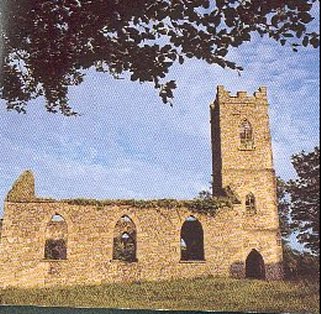Hughie’s friend, who was with him at the end, came to the funeral. He had tried to lift the car off his shattered chest. Ignoring everyone else as he entered, he headed straight for the small bedroom when Hughie’s body lay at rest. He left soon after.
Earlier in the evening when I was told what had happened, I wanted to kill him. It was he who was driving the car when it plunged off the road bridge and into the river and I held him responsible for my brother’s death. But now he seemed so contrite and so vulnerable and so humbled that I only pitied him.
July of the long days blended with the short night: the planet turned on its axis as we prayed and I wondered why I was praying. My mother, after that first heart-breaking encounter with her son’s corpse – now bewildered and worn out with grief – slept.
I felt my mother’s emotional state was precariously balanced. I dreaded the moment when the undertakers would remove the body from the room to place it in the hearse. My sisters, also sensitive to her state, kept her occupied getting her dressed and ready.
The hearse arrived and the morticians went to work. But she insisted on looking at the body again once more before it was removed. Her face a tortured mask of silent grief, she bent over the body.
I casually remarked to myself on her curved back, the cheap, old-fashioned overcoat and the white woollen bonnet on her head. She placed her hand on Hughie’s cold brow and with the other she touched the crucifix wrapped in his folded hands. It was as a mother might soothe an injured child:
‘There, there, now, it’s all right! It’s all right!’
But it wasn’t. I wanted to take her in my arms and comfort her and let my tears mingle with hers. It would be such a relief. But I just couldn’t do it! Instead I took her by the arm and led her out of the room and left her there in my sister’s care. I returned and urged the undertakers to hurry.
She maintained control during the mass and even afterwards. Felix and I stood at either side of her outside the church on the way to the graveside. The pallbearers in front of us were preceded by the priest in a white surplice, chanting the prayers for the dead. My father was a step ahead of us. Behind us came the rest of the family and behind them, the friends and neighbours.
The pallbearers, all Hughie’s contemporaries, placed the coffin on two planks that had been laid astride of the opened grave. As soon as they began to lower it, the emotional dam broke, the pent-up agony burst forth. Mother turned away from the grave with a heart-rending hysterical cry of grief. We were all affected.
As before Felix and I walked her up and down the path outside the church. The gravediggers, we could see in our peripheral vision, were frantically shovelling earth into the hole. The mourners began to drift away leaving my father and sisters, who waited until the men shouldered their shovels and they too departed.
Neighbours were solacing mother now.
Like a brief but violent thunderstorm that slowly recedes, so too did her lamentations gradually subside.
This storm would leave deep, lasting scars that might finally abate but would never vanish.
… Dad reaches out …
